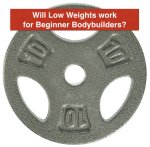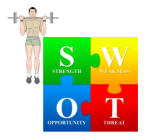Discover the Power of Carbohydrates for Muscle Recovery and Growth
Carbohydrates or carbs are the primary fuel for muscle building. Discover how carbs help muscle growth, how much you need and how to get high performance workouts every time.
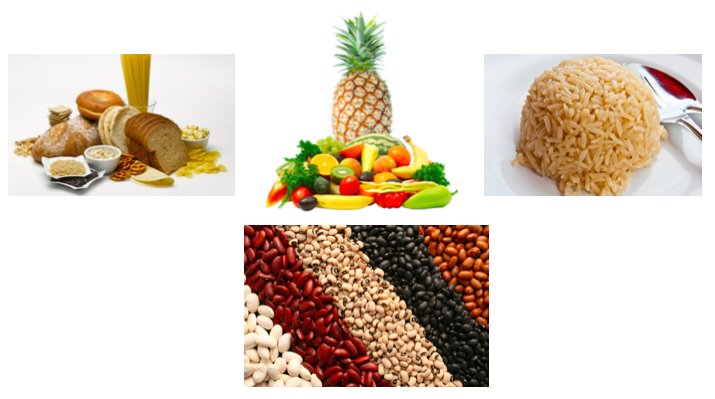 Right Carbs are the key to high Performing Workouts!
Right Carbs are the key to high Performing Workouts!"He who uses Carbs best, WINS. Not the one who uses most carbs".
As a bodybuilder you have three goals for carbohydrates.
1. Have enough carbs for fuelling high intensity workouts
2. Recover your muscles and liver glycogen stores fully before next workout and
3. Yes, as rest of non-trainers we need glucose for energy for routine activities all day long, brain works only on glucose.
High quality Carbohydrates, from excellent sources, spaced well during the day, especially around your workouts are the KEY to achieve the above goals.
Carbohydrates are macronutrients, needed by your body in larger {macro = large} quantities. They are the main source to fuel your training.
Not only that, muscle growth happens only in their presence. Yes, without enough carbs, your proteins are wasted.
The quantity, quality and timing of carb intake will affect how your muscles are built. And in this article you will find the optimal carb intake, best carb sources and how to use nutrient timing for accelerated muscle growth.
Inside This article
- Why you need Carbs to build muscle
- Simple and complex carbs for the bodybuilder
- Carbs and Insulin response - What happens when you eat carbs
- How to calculate your carb intake on workout and non-workout days
- Best Carbohydrate foods for muscle building
- Nutrient Timing and Combining carbs for Lean muscle gains
- Summary and Action Points
Why Muscle Builders Need Carbohydrates
The Importance of Carbs for Bodybuilding
In a protein-centric bodybuilding world, skinny hardgainers should pay equal importance to carb intake as it provides the fuel for muscle training. And without sufficient carbs throughout the day, the body turn to proteins and breaks them down.
Having being called a protein boy all my life, I realised that most muscle builders give less importance to proteins then carbs. And we were paying a heavy price in terms of performance. Big mistake.
Because carbs help us fill the most important nutrient goal - Eating sufficient calories, ignore them at your own peril.
So why do you need at least 40% calories from carbs? Because:
- Carbs are your body’s main energy fuel. Your brain, blood and all organs use glucose for energy. Don’t provide them in your diet, they turn proteins and fats to glucose {gluconeogenesis} and use them instead.
- You need carbs for high energy workouts. During training your liver and muscle glycogen {stored forms of glucose} are released into blood and used by working muscles. Low carbs mean low workout energy and low intensity workouts. All this translates to less muscle stimulation.
- You need carbs to recover from intense workouts. Adding a recovery drink of carbs + proteins is essential for faster muscle and liver recovery. and recovery = Muscle growth.
So optimal carb intake means:
- Greater mental focus and concentration
- High energy for high intensity workouts and
- Complete Muscle recovery
But there is a downside to more carbs. If you consume more carbs than required, they will be stored as fats, especially around your waist and make you skinny fat, or muscular fat.
To Summarise:
- Who uses carbs best, wins. Not who uses most carbs.
- Carbs are your friend and need for intense workouts and recovery
- Quality of carbs and timing of their intake dictates how carbs are used
But are all carbs the same? No. Read on...
Simple and Complex Carbs for the bodybuilder

Can you tell me few carb sources you know of?
If you said cookies, chips and grains, then you know few low quality carb resources.
If you said fruits, vegetables and beans, then you know few of the best quality carb resources.
Lesson: Not all carbs are the same. And not carbs are best at all times.
Grains in the above example are complex carbs and fruits {mostly} are an example of simple carbs. Both contain glucose and are must for muscle building.
Which ones are good?
YOU NEED BOTH. But at their appropriate times.
Remember the Muscle Building Toolbox? Nothing is bad per se but depends on how you use them.
What’s important for bodybuilders is the fact that simple sugars release energy faster, hence best for pre-workout and immediate post-workout recovery drinks.
And complex carbs release sugars slowly, thanks to slower insulin response and hence are perfect for rest of the day when carbs are required but not as much.
I give a full list of carbs below but here are two examples.
Carbohydrate Type
Food
Glycemic Index
Simple Carbs
Raisins, Bananas, White Bread, Maltodextrins
More than 69
Complex Carbs
Vegetables, Rye bread, Yams, Apples
Less than 56
What happens when you eat Carbs - Carbs and the Insulin response
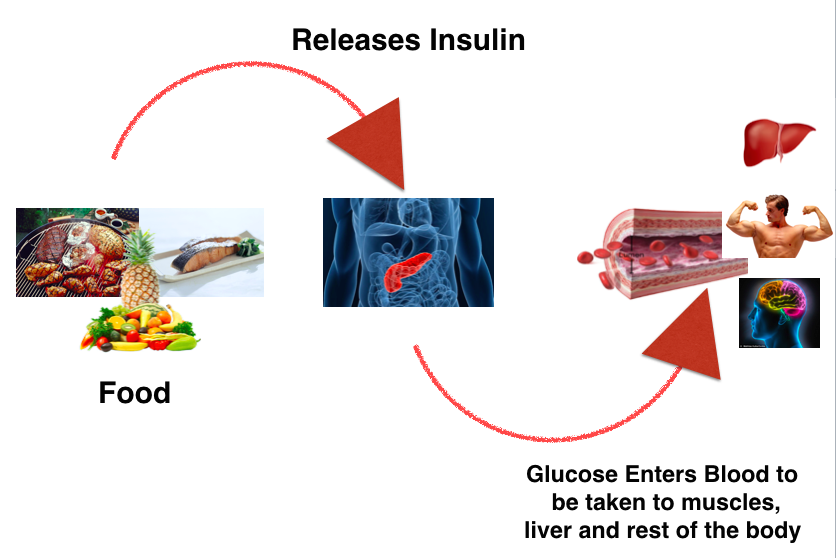 Carbohydrates and Insulin Response
Carbohydrates and Insulin ResponseEat any carbohydrate there is an immediate insulin release from pancreas.
The quantity of insulin depends on the amount of broken down glucose, which is high in case of simple sugars which are easy broken down.
Insulin is THE Storage hormone of your body. Once released, its primary job is to store glucose into liver and muscles cells, leaving small quantities of glucose in blood.
Post exercise your body craves for glucose. Your muscle and liver cells are hungry for glucose as it has been used up for energy during training. Hence insulin receptors on the muscles are very active and shove majority of blood glucose into these cells.
We call this muscle recovery and replenishment. This is the basis of muscle growth as starved muscles never grow.
I recommend high GI carb sources like maltodextrin and raisins as they cause faster muscle and liver glycogen replenishment. insulin loves to take them to target cells faster. Maltodextrin can be mixed with quality whey protein to make up what I call the last exercise of any workout - your post workout recovery shake.
What about the rest of the day?
Remember how I started the article with a quote from Ben Pakulski?
He who uses carbs best, WINS.
The reason is that Insulin is a double edged sword. For all its muscle building actions, it is a storage hormone and if you consume too many carbs, or at the wrong times, they get stored as fats.
Imagine eating a high GI carb in high quantities during lunch or on non-workout days.
Since your body doesn’t need more of them, they get stored as fats.
But eat low GI carbs in required quantities {see below} only, you get a slow insulin response and little or no fat storage.
Eat fruits and vegetables as your primary carb sources during rest of the day. They are called slow digesting carbs and cause slow insulin release and hence least chance of fat storage.
Therefore quantity of carbs and timing affects how your body uses them.
Next: So carbs are key to performance and their type & timing matters, but how many carbs do you need exactly? Let’s move on...
How to Calculate your carb intake perfectly
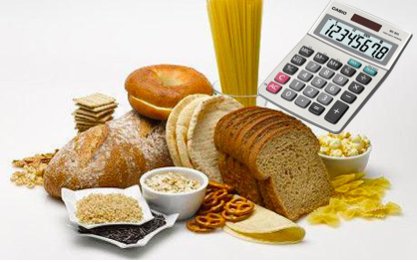
"Accurate carb intake will be the difference between high energy or low energy workouts, between being skinny fat or pure muscular".
Although general recommendations like 5 to 6 grams of carbs per kilogram of bodyweight serve well for sportsmen, bodybuilders need two things to consider
1. The percentage of calories that should come from carbs
2. timing of carbs to prevent fat gain and muscle loss
My Best Recommendation: Carbohydrates should form no less than 40% of your daily calories and most carbs should be consumed before and after workouts.
For example a 150 lb bodybuilder needs 3000 calories and 40%, i.e. 1200 calories should come from carbs.
This comes to around 300 grams per day or 50g car over 6 meals.
This ensures that your muscles and liver are fully loaded up and your build maximum muscle with minimal fat gain.
Carb Intake on Workout Days
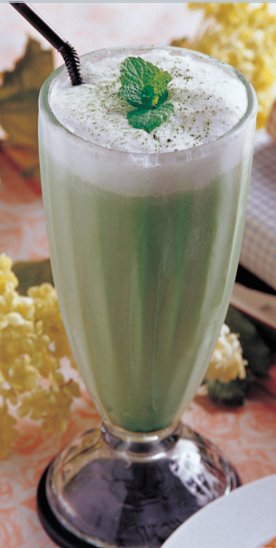
In addition to the above 300g of carbs, you need carbs around workout for optimal performance.
You have 3 times when you need need carbs for maximum energy and for muscle recovery.
Your Pre-workout Carb Intake:
Your goal here to ensure you have enough proteins and carbs to have a high intensity workout.
Using my results and those of my clients’ as experiments and research has proven this, I have found that you need pre-workout workout and post workout nutrients in the following ratios: {1}
Pre-workout
Carbs + Proteins
Workout
Carbs + Proteins
Post-workout
Carbs + Proteins
0.8g carbs per kg bodyweight and
0.4g proteins per kg bodyweight
0.8g carbs per kg bodyweight and
0.4g proteins per kg bodyweight
0.8g carbs per kg bodyweight and
0.4g proteins per kg bodyweight
So a 65 kg guy would consume, 50g of carbs and 25g of proteins 15-30 mins before, during and after workout.
Pre-workout
Carbs + Proteins for 65kg guy
50g Carbs
+
25g Proteins
Workout
Carbs + Proteins for 65kg guy
50g Carbs
+
25g Proteins
Post-workout
Carbs + Proteins for 65kg guy
50g Carbs
+
25g Proteins
Sound too much? Don't worry, you don't have to get it perfect right now. Start with half the counts, stay with it for 2 weeks, notice the improvement. Then as your body adjusts, add to make it accurate for your body weight.
Why proteins but no fats around workout?
I have added proteins at all 3 times as studies have shown that both glycogen storage and protein synthesis are enhanced if proteins and carbs are combined in these times.
Absence of fats is to be noted, fats blunt the anabolic hormone response and are best avoided in these times.
Best Carbohydrate Foods for the Bodybuilder
All carbs are good but not at all times and in all quantities.
Simple Carbs are excellent before, during and after workout.
Complex carbs are excellent at rest of the times.
Begin your muscle building journey by picking these carb sources. I will give you many more sources, but these are the best carb foods which should be in every muscle builders grocery list.
Best Carbohydrate sources for around the workout nutrition
As you will consume fast acting carbs in this window you get immediate energy. And this will be the basis of high energy, high intensity workouts.
Shock your friends with your new energy levels and PRs {personal records}
Foods
Raisins, Bananas,
Glucose and glucose polymers like maltodextrin
Why they work
Best Eaten at least 30 mins before workouts as they need to pass through your stomach
the best fast acting carbs around workout.
Maltodextrins or simple glucose will provide energy and lead to muscle recovery post workouts.
Fruits are not the best source as they contain fructose which has been proven to provide insufficient muscle recovery but good liver glycogen recovery. Hence use maltodextrin or plain glucose with proteins.
Best Carb sources for rest of the day
But what about the rest of the day? You will only consume slow digesting, complex carbs for the rest of the day to maintain energy while building muscle mass.
But even those are best kept in line with caloric intake. Any excess carbs will be stored as fat and fat cause insulin resistance. Insulin resistance in turn leads to decreased protein synthesis {insulin is an anabolic hormone remember?}.
Always try to keep body fat low during muscle gain phases with optimal carb intake.
1.Fruits
Red: apples and strawberries
Orange: oranges and peaches
Yellow: pineapples and bananas
Green: kiwi and green grapes
Blue: blueberries
Purple: prunes and blackberries
2. Vegetables: All colors especially greens. Vegetables are the best sources of carbs as they have complex carbs, high fiber, enzymes and anti-oxidants.
3. Beans - Both black and brown have proteins and fiber too
4. Oatmeal for breakfast
5. Quinoa, rye bread and sweet potato
My Tip: Add a piece of fruit at 2 put of 4 meals. Eat a rainbow of colors and get the best carbs, vitamins and anti-oxidants all packed in one food.
Nutrient Timing and Carb Combination for Lean Muscle gains
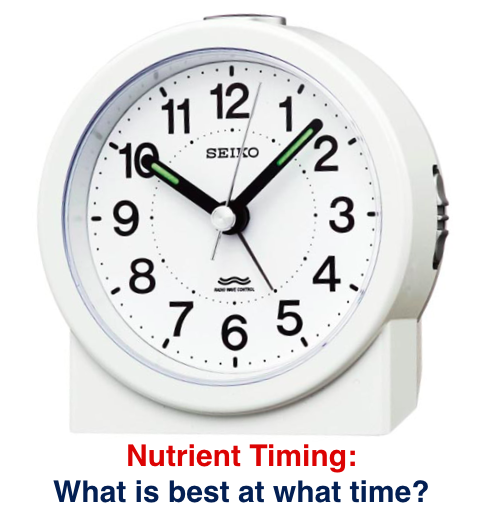
I have covered nutrient timing earlier and the importance of carbs around workout. But there is one secret that makes carbs work even better. How?
Add proteins and fats to your carbs and watch them work their magic.
By combining proteins and fats, they slow the digestion and absorption of carbs and keeps their release slow and sustained.
This ensures there is no insulin spike at unnecessary times {except around workout and as you can see in the above calculation I avoided fats totally during the workout times}.
Summary and 5 Action Points
- Don’t be afraid of carbs. They are your friend. They help you train harder, recover faster and sleep better.
- know how they help the bodybuilder, find the best foods and know when to eat which foods for maximum muscle gain?
- Is there a carb in your hand? Is it on the list? What is the best time to eat it? These three questions will ensure you have all the energy during your workouts and have complete muscle and brain recovery after workouts.
- Always choose unprocessed over processed, whole wheat over white breads and real fruits over fruit juices.
- Simple glucose or maltodextrin are best carbs around workouts as they are fast acting. Vegetables are the best carb sources for the rest of the days.
Recent Articles
-
Bodybuilding Workouts & Muscle Building Workout Routines that Build Muscle
Jul 01, 17 09:52 AM
Discover effective bodybuilding workouts and muscle building routines with strategies to make every workout a killer one. Download free 3-day, 4-day or 5-day workout routines. -
Why Beginner Bodybuilders must use Light Weights for Muscle Gain
Jul 01, 17 09:44 AM
Discover the science why beginner bodybuilders must use light to moderate weights to gain maximum muscle mass in the first 2-3 months of training to gain muscle, prevent injuries and grow bigger. -
How to do a S.W.O.T Analysis of Your Bodybuilding Workout
Oct 26, 16 01:41 AM
Looking to take your bodybuilding workout to the next level? Then do a SWOT analysis of your muscle building workout to increase your lifts every workout.



